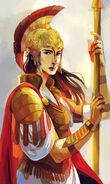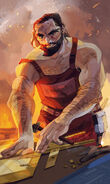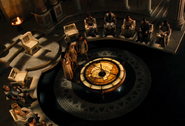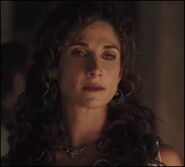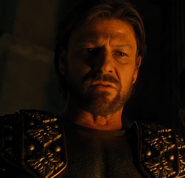mNo edit summary |
|||
| Line 44: | Line 44: | ||
== Changes in the Guard == |
== Changes in the Guard == |
||
| − | Although they are technically Olympians, Hades did not hold a throne on Olympus before the conclusion of the Second Titan War |
+ | Although they are technically Olympians, Hades did not hold a throne on Olympus before the conclusion of the Second Titan War. Hestia renounced her throne when Dionysus was made a god to avoid a conflict among the council. To give amnesty and recognition to them, thrones were granted to several among the minor [[gods]]. Each of the Olympian councilors are represented by a [[cabin]] at [[Camp Half-Blood]]. |
=== Major Olympians === |
=== Major Olympians === |
||
Revision as of 21:57, 5 September 2013

Eleven gods are shown here.
The Olympians are a council of Ancient Greek and Roman gods and goddesses.
First Generation Olympians
The first generation of Olympians were the six children of the Titans, Kronos, and Rhea.
In order from oldest to youngest:
- Hestia: Goddess of the Hearth, Home, and Family.
- Demeter: Goddess of Agriculture, Harvest and Seasons.
- Hera: Goddess of Marriage and Women, Queen of Olympus.
- Hades: God of the Dead, Wealth, and Lord of the Underworld.
- Poseidon: God of the Sea, Earthquakes, and Horses; King of Atlantis.
- Zeus: Lord of the Sky; King of the Gods; King of Olympus.
Second Generation Olympians
After the first war against the Titans, several gods assumed thrones on Olympus, mainly the children of Zeus. In order from oldest to youngest
-Ares: god of war
-Hephaestus: god of metalworking and fire
-Athena: goddess of wisdom and battle strategy
-Aphrodite: goddess of love and beauty
-Apollo: god of light and music
-Artemis: goddess of the hunt
-Hermes: messenger of the gods
-Dionysus: god of wine and party
Minor Olympians
After the Olympian victory in the second war against the Titans, some of the minor gods were granted positions on the divine council at Percy Jackson's request.
- Hebe: Goddess of Youth and Former Cupbearer of the Gods, daughter of Zeus and Hera.
- Hecate: Goddess of Magic and Witchcraft, daughter of Perses and Asteria.
- Hypnos: God of Sleep, son of Nyx.
- Iris: Goddess of the Rainbow and Messenger of Olympus, daughter of Thaumas and Electra.
- Nemesis: Goddess of Retribution and Balance, daughter of Erebus and Nyx.
- Nike: Goddess of Victory and Divine Charioteer, daughter of Pallas and Styx.
- Tyche: Goddess of Luck and Fortune, daughter of Oceanus and Tethys.
Changes in the Guard
Although they are technically Olympians, Hades did not hold a throne on Olympus before the conclusion of the Second Titan War. Hestia renounced her throne when Dionysus was made a god to avoid a conflict among the council. To give amnesty and recognition to them, thrones were granted to several among the minor gods. Each of the Olympian councilors are represented by a cabin at Camp Half-Blood.
Major Olympians
| Greek Name | Roman Name | Description | |
| Aphrodite | Venus | Goddess of Love and Beauty | |
| Apollo | Apollo | God of Music, Prophecy, Medicine, and the Sun | |
| Ares | Mars | God of War | |
| Artemis | Diana | Goddess of the Hunt and Moon | |
| Athena | Minerva | Goddess of Wisdom, Crafts, and Strategy | |
| Demeter | Ceres | Goddess of Agriculture and Seasons | |
| Dionysus | Bacchus | God of Wine and Ecstasy | |
| Hades | Pluto | God of the Underworld and Wealth | |
| Hephaestus | Vulcan | God of the Forge, Blacksmiths, and Fire | |
| Hera | Juno | Goddess of Marriage and Women | |
| Hermes | Mercury | Messenger of the Gods, God of Travel and Thieves | |
| Hestia | Vesta | Goddess of the Hearth, Home, and Family | |
| Poseidon | Neptune | God of the Sea and Earthquakes | |
| Zeus | Jupiter | God of the Sky and King of Olympus | |
Minor Olympians
| Greek Name | Roman Name | Description |
| Hebe | Juventas | Goddess of Youth and Former Cupbearer of the Gods |
| Hecate | Trivia | Goddess of Magic and Crossroads |
| Hypnos | Somnus | God of Sleep |
| Iris | Arcus | Messenger of Olympus and Goddess of Rainbows |
| Nemesis | Invidia | Goddess of Retribution and Balance |
| Nike | Victoria | Goddess of Victory and Divine Charioteer |
| Tyche | Fortuna | Goddess of Luck and Fortune |
Personalities
As gods, the Olympians, and in particular the twelve council members, have extremely diverse personality traits that coincide with the realms and /or concepts that they represent. For instance, Zeus is typically stern, to the point, often abrupt, and authoritative, which coincides with his being the ruler of the sky and the king of the gods. His sister, Demeter, on the other hand is shown to have a motherly, fussy, overbearing demeanor with an inordinate obsession with agriculture and related products. Hades is often bitter, angry, and resentful, which humans typically view as an attitude appropriate to the dead.
The twelve main Olympians do share several traits however. The first and most important is that they are all easily offended. Almost all of the gods that so much as sense a slight against them tend to react ominously. Dionysus is often described as having purple flames appear in his eyes, and Hermes at one point transformed his caduceus into a cattle-prod when angered. Each Olympian is also to some degree dismissive of the needs and desires of other gods, especially when they conflict with their own. Aphrodite was willing to allow Artemis to remain kidnapped, as she represented chastity and freedom from romantic love. Hera showed a similar disregard for certain elements of her family that threatened to unbalance her perfect family image.
Trivia
- The Olympians were the most powerful during the Bronze, and early Iron Ages because during that time, humans believed very much in the gods and had several conflicts with each other. All of them wanted the Olympians to support them so that they could emerge victorious. Thus as long as humans fought with one another, they were dependent on the gods.
- The opposite to the Olympian gods were the Chthonic gods which were sacrificed differently to. Instead of Olympian sacrifices, (where the chosen sacrificed object was burnt and so the smoke produced rose up to the gods) Chthonic gods were celebrated by letting the blood of an animal sink down into the ground.
- It is said that the gods are strongest during the Summer and Winter Solstice. This is because on these days the gods all gather together on these days, with Hades only gathering on the Winter Solstice to help fend off evil forces.



